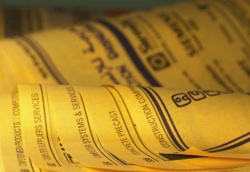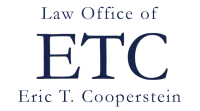 A few months ago, I posted a warning to lawyers about emailing clients at work. My concern was based in large part on a NJ district court decision that found an employee had waived the attorney-client privilege for emails that she sent to her attorney while using her work computer. Although the emails had been sent using a Yahoo! account, the employer found images of the emails on the employee’s hard drive.
A few months ago, I posted a warning to lawyers about emailing clients at work. My concern was based in large part on a NJ district court decision that found an employee had waived the attorney-client privilege for emails that she sent to her attorney while using her work computer. Although the emails had been sent using a Yahoo! account, the employer found images of the emails on the employee’s hard drive.
Uncategorized
Lawyerist.com: A CLE presenter is born
 Recently, I noted on a listserv that one of the cheapest ways to get CLE credits and market oneself at the same time is to teach CLEs. In Minnesota, presenters can receive credit for the time spent preparing the seminar, plus the organizers usually let the presenters attend the rest of the program for free.
Recently, I noted on a listserv that one of the cheapest ways to get CLE credits and market oneself at the same time is to teach CLEs. In Minnesota, presenters can receive credit for the time spent preparing the seminar, plus the organizers usually let the presenters attend the rest of the program for free.
Lawyerist.com: Facebook ethics: it’s not about Facebook
 There is a good deal of postulating in the blogosphere about the types of ethical trouble a lawyer can get into by using social media. The nattering nabobs of negativism warn us to be careful when using social media like Facebook or Twitter, lest we unwittingly disclose client confidences, improperly solicit new clients, or misrepresent facts or law.
There is a good deal of postulating in the blogosphere about the types of ethical trouble a lawyer can get into by using social media. The nattering nabobs of negativism warn us to be careful when using social media like Facebook or Twitter, lest we unwittingly disclose client confidences, improperly solicit new clients, or misrepresent facts or law.
Lawyerist.com: Your honor, I move to strike
 For the most part, rude or obnoxious behavior between attorneys does not result in an ethics violation. But sometimes, lawyers can just go too far. An excerpt from the Louisiana Supreme Court’s Decision in In re Greenburg (May 5, 2009): “During the hearing, Mr. Greenburg suggested that…
For the most part, rude or obnoxious behavior between attorneys does not result in an ethics violation. But sometimes, lawyers can just go too far. An excerpt from the Louisiana Supreme Court’s Decision in In re Greenburg (May 5, 2009): “During the hearing, Mr. Greenburg suggested that…
Lawyerist.com: Emailing clients at work may imperil privilege
 It is probably fair to say that most lawyers have grown accustomed to the convenience of emailing clients. Less disruptive than phone calls, more efficient, creates documentation of conversations—hard to believe anyone could ever practice law without email. From an ethics perspective…
It is probably fair to say that most lawyers have grown accustomed to the convenience of emailing clients. Less disruptive than phone calls, more efficient, creates documentation of conversations—hard to believe anyone could ever practice law without email. From an ethics perspective…
Lawyerist.com: Two states opt for sane lawyer advertising rules
 Within recent days two states – Maine and Alabama– have turned back restrictive lawyer advertising proposals (first heard from the ABA’s Will Hornsby, who is now on twitter). Let’s hope it’s part of a trend. Maine became another of the vast majority of states to adopt rules (effective Aug. 1, 2009) consistent with the ABA’s revised Model Rules of Professional Conduct.
Within recent days two states – Maine and Alabama– have turned back restrictive lawyer advertising proposals (first heard from the ABA’s Will Hornsby, who is now on twitter). Let’s hope it’s part of a trend. Maine became another of the vast majority of states to adopt rules (effective Aug. 1, 2009) consistent with the ABA’s revised Model Rules of Professional Conduct.
Lawyerist.com: Notes from a Twitter curmudgeon
 To my own surprise, I’ve been using Twitter lately (“tweeting,” for those in the know). I say surprise because I really still don’t understand what all the fuss is about. But there’s an awful lot of fuss and I hate to be the last one to show up at a party. Since Sam encouraged people last week to use Twitter, I thought I’d share how I’m using Twitter so that maybe others will be persuaded to give it a try as well.
To my own surprise, I’ve been using Twitter lately (“tweeting,” for those in the know). I say surprise because I really still don’t understand what all the fuss is about. But there’s an awful lot of fuss and I hate to be the last one to show up at a party. Since Sam encouraged people last week to use Twitter, I thought I’d share how I’m using Twitter so that maybe others will be persuaded to give it a try as well.
Lawyerist.com: Goliath gets poked in the eye
 The Massachusetts Supreme Judicial Court gave a boost to on-line legal education (and declined to bow down to the ABA) recently when it allowed a graduate of Concord Law School, an entirely on-line law school owned by Kaplan, Inc., to sit for the Massachusetts Bar Exam, despite a state rule that prohibits graduates from unaccredited law schools from taking the exam. The decision is available on-line (of course!).
The Massachusetts Supreme Judicial Court gave a boost to on-line legal education (and declined to bow down to the ABA) recently when it allowed a graduate of Concord Law School, an entirely on-line law school owned by Kaplan, Inc., to sit for the Massachusetts Bar Exam, despite a state rule that prohibits graduates from unaccredited law schools from taking the exam. The decision is available on-line (of course!).
Lawyerist.com: New salvo in metadata battle
 Maine has become the latest state to take sides in the grudge match over whether it is ethical for lawyers to search electronic documents for metadata hidden beneath the bytes. Maine says no, joining New York (both the state and county bars), Florida, Alabama, and Arizona. The ABA (Formal Op. 06-442), Maryland, Colorado, and D.C. place the heavier burden on the party creating or sending the electronic document and permit recipient lawyers to search at will. Pennsylvania sort of punted.
Maine has become the latest state to take sides in the grudge match over whether it is ethical for lawyers to search electronic documents for metadata hidden beneath the bytes. Maine says no, joining New York (both the state and county bars), Florida, Alabama, and Arizona. The ABA (Formal Op. 06-442), Maryland, Colorado, and D.C. place the heavier burden on the party creating or sending the electronic document and permit recipient lawyers to search at will. Pennsylvania sort of punted.
Lawyerist.com: Delete that thread!
 I’ll confess, I’m a threader. I have my mail program set so that when I respond to an e-mail, the previous posts become part of the new message. That way, after multiple exchanges with one person, I can keep just the most recent e-mail and delete all the earlier messages, leaving the entire thread intact in just one message.
I’ll confess, I’m a threader. I have my mail program set so that when I respond to an e-mail, the previous posts become part of the new message. That way, after multiple exchanges with one person, I can keep just the most recent e-mail and delete all the earlier messages, leaving the entire thread intact in just one message.
